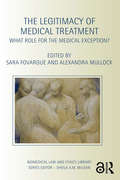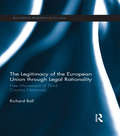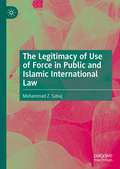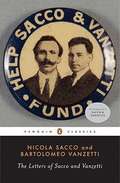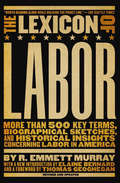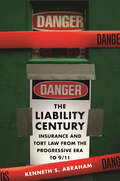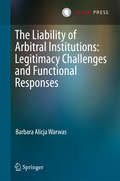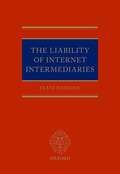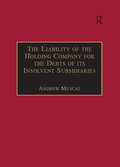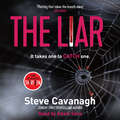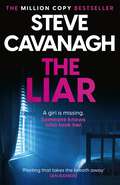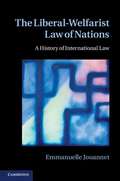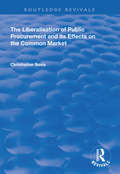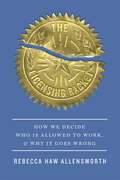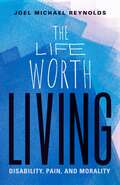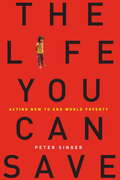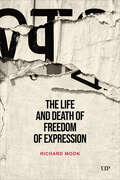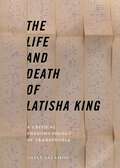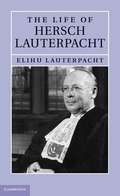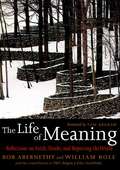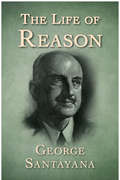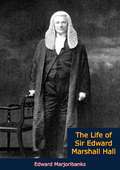- Table View
- List View
The Legitimacy of Medical Treatment: What Role for the Medical Exception? (Biomedical Law and Ethics Library)
by Sara Fovargue Alexandra MullockWhenever the legitimacy of a new or ethically contentious medical intervention is considered, a range of influences will determine whether the treatment becomes accepted as lawful medical treatment. The development and introduction of abortion, organ donation, gender reassignment, and non-therapeutic cosmetic surgery have, for example, all raised ethical, legal, and clinical issues. This book examines the various factors that legitimatise a medical procedure. Bringing together a range of internationally and nationally recognised academics from law, philosophy, medicine, health, economics, and sociology, the book explores the notion of a treatment, practice, or procedure being proper medical treatment, and considers the range of diverse factors which might influence the acceptance of a particular procedure as appropriate in the medical context. Contributors address such issues as clinical judgement and professional autonomy, the role of public interest, and the influence of resource allocation in decision-making. In doing so, the book explores how the law, the medical profession, and the public interact in determining whether a new or ethically contentious procedure should be regarded as legitimate. This book will be of interest and use to researchers and students of bioethics, medical law, criminal law, and the sociology of medicine. Chapter 6 of this book 'Family perspectives on proper medical treatment for people in prolonged vegetative and minimally conscious states' by Celia Kitzinger and Jenny Kitzinger is available under an open access CC BY NC ND license and can be viewed at: http://preview.ncbi.nlm.nih.gov/books/prevqa/NBK199156/ .
The Legitimacy of The European Union through Legal Rationality: Free Movement of Third Country Nationals (Routledge Research in EU Law)
by Richard BallThird country nationals (TCNs) play an important part in the economy of the European Union, reflected in the rights granted to them under European Union Law. Political expediency is however shaped by world, regional and domestic influences that in turn determine policy towards third country nationals and their legal rights to freedom of movement. This book examines the concept of political legitimacy within the European Union through the principles of legal rationality, focusing in particular on the European Union’s policy towards third country nationals. Richard Ball argues that for legal doctrine to be rational it must display the requirements of formal, instrumental and substantive rationality, each mutually exclusive and essential. In taking this position of legal rationality, the book focuses on free movement rights of TCNs within EU treaties and implementing legislation, the Area of Freedom Security and Justice, and Association Agreements. Ball concludes that the stance of European Union Law towards third country nationals lacks legitimacy, and suggests possible new directions that EU policy should take in the future.
The Legitimacy of Use of Force in Public and Islamic International Law
by Mohammad Z. SabujThis book investigates the legitimacy deficits of two potentially conflicting legal systems, namely Public and Islamic international law. It discusses the challenges that Public international law is being presented within the context of its relationship with Islamic international law. It explores how best to overcome these challenges through a comparative examination of state practices on the use of force. It highlights the legal-political legacies that evolved surrounding the claims of the legitimacy of use of force by armed non-state actors, states, and regional organizations. This book offers a critical analysis of these legacies in line with the Islamic Shari‘a law, United Nations Charter, state practices, and customs. It concludes that the legitimacy question has reached a vantage point where it cannot be answered either by Islamic or Public international law as a mutually exclusive legal system. Instead, Public international law must take a coherent approach within the existing legal framework.
The Letters of Sacco and Vanzetti
by Nicola Sacco Bartolomeo VanzettiCommemorating the eightieth anniversary of Sacco and Vanzetti's execution- with a new cover and new foreword Electrocuted in 1927 for the murder of two guards in Massachusetts, the Italian- American anarchists Nicola Sacco and Bartolomeo Vanzetti defied the verdict against them, maintaining their innocence to the end. Whether they were guilty continues to be the subject of debate today. First published in 1928, Sacco and Vanzetti's letters represent one of the great personal documents of the twentieth century: a volume of primary source material as famous for the splendor of its impassioned prose as for the brilliant light it sheds on the characters of the two dedicated anarchists who became the focus of worldwide attention. .
The Lexicon of Labor: More Than 500 Key Terms, Biographical Sketches, and Historical Insights Concerning Labor in America
by R. Emmett MurrayA thoroughly updated edition of the clever, fun-to-read compilation of union language and lore. &“Worth reading aloud while walking the picket line.&” —The Seattle Times First published in 1998, The Lexicon of Labor found a large and appreciative following among readers who were grateful to have the vibrant, powerful language of the labor movement captured in a lively single volume. This long-awaited revised and updated edition includes dozens of new terms and developments that will introduce a new generation to the labor lexicon. From Frederick Douglass to César Chávez, from the Haymarket Riots in 1886 to the Change to Win federation formed in 2005, this classic labor lexicon provides concise, enlightening sketches of over five hundred key places, people, and events in American labor history. A practical resource for students and journalists, The Lexicon of Labor is as entertaining for longtime union members seeking to get reacquainted with the traditions of the movement as it is for newcomers wishing to discover the unique language and history of unionism. The Lexicon of Labor also includes explanations of major legislative acts, definitions of key legal terminology, and complete listings of all the member unions of the AFL-CIO and independent unions in the United States. It is the perfect introduction to the history of labor in America. &“A handy reference for individuals who want an introduction to U.S. labor terminology and labor history.&” —Library Journal &“Fills a longstanding void . . . by far the largest compilation of definitions of words and phrases used in the specialized vocabulary of unionists.&” —Northwest Labor Press
The Liability Century: Insurance and Tort Law from the Progressive Era to 9/11
by Kenneth S. AbrahamKenneth Abraham explores the development and interdependency of the tort liability regime and the insurance system in the United States during the twentieth century and beyond, including the events of September 11, 2001.From its beginning late in the nineteenth century, the availability of liability insurance led to the creation of new forms of liability, heavily influenced expansion of the liabilities that already existed, and continually promoted increases in the amount of money that was awarded in tort suits. A “liability-and-insurance spiral” emerged, in which the availability of liability insurance encouraged the imposition of more liability, and, in turn, the imposition of liability encouraged the further spread of insurance.Liability insurance was not merely a source of funding for ever-greater amounts of tort liability. Liability insurers came to dominate tort litigation. They defended lawsuits against their policyholders, and they decided which cases to settle, fight, or appeal. The very idea behind insurance––that spreading losses among large numbers of policyholders is desirable––came to influence the ideology of tort law. To serve the aim of loss spreading, liability had to expand.Today the tort liability and insurance systems constantly interact, and to reform one the role of the other must be fully understood.
The Liability of Arbitral Institutions: Legitimacy Challenges and Functional Responses
by Barbara Alicja WarwasThis book offers an innovative approach to the topic of liability in international arbitration, a controversial topic that has heretofore not been fully explored in the scholarship. Arbitral institutions have recently emerged as powerful actors with new functions in and outside arbitration processes. The author proposes to shift the debate on liability from arbitrators to the arbitral institutions. The book re-evaluates the orthodox understanding of the status, functions, and responsibility of arbitral institutions and is recommended for arbitration scholars, practitioners, and students. It is argued that the current regulations regarding liability are inadequate given both the contractual obligations and the emerging public function of arbitral institutions and that institutional arbitral liability is therefore necessary. The book also links the contemporary functions of arbitral institutions to recent debates regarding legitimacy challenges in international commercial arbitration. Responding to these challenges, a model of institutional contractual liability is proposed that invites arbitral institutions to proactively regulate the scope of their liability.
The Liability of Internet Intermediaries
by Jaani Riordan<P>There is no book dedicated to the doctrines and remedies which regulate the legal liability of internet intermediaries.<P> This is surprising, given that we live in an era in which almost all communications and transactions rely upon services provided or facilitated by such intermediaries.
The Liability of the Holding Company for the Debts of its Insolvent Subsidiaries
by Andrew MuscatThis work deals with the liability of the holding company for the debts of its insolvent subsidiaries. In analyzing the current position under English law, the work challenges as outmoded and inadequate the virtual dogma that a holding company is not answerable for the debts of its insolvent subsidiaries. The study identifies four separate and distinct types of behavioural practices within corporate groups which may prejudice the interests of external creditors or otherwise constitute an abuse of the corporate form; the subservient subsidiary situation; the inadequately financed subsidiary situation; the integrated economic enterprise situation; and the group persona situation. After weighing the various arguments for and against a change in the law and concluding that reform is called for, the study proceeds to submit some radical proposals for reform. The basic thrust of the reform proposals is that in a number of well-defined situations entity law should give way to an enterprise analysis and holding company liability should be imposed for the debts of insolvent subsidiaries.
The Liar: It takes one to catch one. (Eddie Flynn Series)
by Steve CavanaghA must-read for fans of Lee Child, John Grisham and Michael Connelly. Combining gripping action and ingenious plotting, THE LIAR is the brilliant new legal thriller from the author of THE DEFENCE and THE PLEA.A MISSING CHILDWhen wealthy businessman Leonard Howell's daughter is kidnapped, the police jump on it straight away. But Howell knows this won't be straightforward - he needs someone willing to break the rules.A CRIMINAL LAWYEROnce a con artist, now a hotshot lawyer, Eddie Flynn's learnt that fast talk and sleight of hand are just as important in the courtroom are they are on the street. Knowing what it's like to lose a daughter, he'll stop at nothing to save Howell's.A CORRUPT CASEWith a client on trial for his life, and the body count rising, Eddie Flynn is starting to fear that the whole thing was a set-up from the very beginning.The only question is who is deadlier - the man who knows the truth, or the one who believes a lie? A missing girl, a desperate father and a case that threatens to destroy everyone involved - Eddie Flynn's got his work cut out in the thrilling new novel from the author of The Defence.Read by Adam Sims(p) 2017 Isis Publishing Ltd
The Liar: It takes one to catch one. (Eddie Flynn Series)
by Steve Cavanagh***WINNER OF THE CWA GOLD DAGGER AWARD 2018***A MISSING GIRL. A DESPERATE FATHER.A CASE WHICH WILL TEAR THEM APART.'Plotting that takes the breath away' Ian Rankin'A fantastic thriller writer' Mark Billingham* * * * *WHO IS DEADLIER ...Leonard Howell's worst nightmare has come true: his daughter Caroline has been kidnapped. He can't rely on the cops, so Howell calls the only man he trusts to get her back.THE MAN WHO KNOWS THE TRUTH Eddie Flynn knows what it's like to lose a daughter and vows to bring Caroline home safe. Once a con artist, now a hotshot criminal attorney, Flynn is no stranger to the shady New York underworld.... OR THE ONE WHO BELIEVES A LIE?However, as he steps back into his old life, Flynn realizes that the rules of the game have changed - and that he is being played. But who is pulling the strings? And is anyone in this twisted case telling the truth...?* * * * *An ingenious plot, gripping action and characters who leap off the page: discover why readers love Steve Cavanagh:'Cavanagh stands head and shoulders above the competition, with his skilfully plotted, action-packed and big-hearted Eddie Flynn novels . . . highly intelligent, twist-laden and absolutely unputdownable' Eva Dolan, author of the critically acclaimed Tell No Tales'What a thriller! Breathlessly brilliant and fiendishly clever' Miranda Dickinson'A cleverly constructed legal thriller combined with a classic locked-room mystery. Eddie Flynn is fast becoming one of my favourite fictional heroes and Cavanagh one of my favourite thriller writers.' S.J.I. Holliday, author of Black Wood'Raymond Chandler could have created Eddie Flynn. THE PLEA is Phillip Marlowe and Michael Connolly's Mickey Haller combined, with a bit of Jim Thompson's THE GRIFTERS thrown in. A superb read with a main character destined to be one of the most talked about in crime fiction.' Howard Linskey, author of The Search*If you like John Grisham, Lee Child and Michael Connelly, you will LOVE the gripping and twisty Eddie Flynn series:1. The Defence2. The Plea3. The Liar4. Thirteen* Each Eddie Flynn thriller can be read as a standalone or in series order *
The Liar: It takes one to catch one. (Eddie Flynn Series)
by Steve Cavanagh***WINNER OF THE CWA GOLD DAGGER AWARD 2018***A MISSING GIRL. A DESPERATE FATHER.A CASE WHICH WILL TEAR THEM APART.'Plotting that takes the breath away' Ian Rankin'A fantastic thriller writer' Mark Billingham* * * * *WHO IS DEADLIER ...Leonard Howell's worst nightmare has come true: his daughter Caroline has been kidnapped. He can't rely on the cops, so Howell calls the only man he trusts to get her back.THE MAN WHO KNOWS THE TRUTH Eddie Flynn knows what it's like to lose a daughter and vows to bring Caroline home safe. Once a con artist, now a hotshot criminal attorney, Flynn is no stranger to the shady New York underworld.... OR THE ONE WHO BELIEVES A LIE?However, as he steps back into his old life, Flynn realizes that the rules of the game have changed - and that he is being played. But who is pulling the strings? And is anyone in this twisted case telling the truth...?* * * * *An ingenious plot, gripping action and characters who leap off the page: discover why readers love Steve Cavanagh:'Cavanagh stands head and shoulders above the competition, with his skilfully plotted, action-packed and big-hearted Eddie Flynn novels . . . highly intelligent, twist-laden and absolutely unputdownable' Eva Dolan, author of the critically acclaimed Tell No Tales'What a thriller! Breathlessly brilliant and fiendishly clever' Miranda Dickinson'A cleverly constructed legal thriller combined with a classic locked-room mystery. Eddie Flynn is fast becoming one of my favourite fictional heroes and Cavanagh one of my favourite thriller writers.' S.J.I. Holliday, author of Black Wood'Raymond Chandler could have created Eddie Flynn. THE PLEA is Phillip Marlowe and Michael Connolly's Mickey Haller combined, with a bit of Jim Thompson's THE GRIFTERS thrown in. A superb read with a main character destined to be one of the most talked about in crime fiction.' Howard Linskey, author of The Search*If you like John Grisham, Lee Child and Michael Connelly, you will LOVE the gripping and twisty Eddie Flynn series:1. The Defence2. The Plea3. The Liar4. Thirteen* Each Eddie Flynn thriller can be read as a standalone or in series order *
The Liberal-Welfarist Law of Nations
by Emmanuelle Jouannet Christopher SutcliffeAlthough portrayed as a liberal law of co-existence of and co-operation between states, international law has always been a welfarist law, too. Emerging in eighteenth-century Europe, it soon won favour globally. Not only did it minister to the interests of states and their concern for stability, but it was also an interventionist law designed to ensure the happiness and well-being of peoples. Hence international law initially served as a secularised eschatological model, replacing the role of religion in ensuring the proper ordering of mankind, which was held to be both one and divided. That initial vision still drives our post-Cold War globalised world. Contemporary international law is neither a strictly welfarist law nor a strictly liberal law, but is in fact a liberal-welfarist law. In the conjunction of these two purposes lies one of the keys to its meaning and a partial explanation for its continuing ambivalence.
The Liberalisation of Public Procurement and its Effects on the Common Market (Routledge Revivals)
by Christopher BovisFirst published in 1998, Public Procurement in the European Community has been considered as the most-important non-tariff barrier for the completion of the common market and its liberalisation reflects the attempts of law and policy makers to enhance competitiveness in the public sector and achieve uniform patterns of industrial efficiency. The opening-up of procurement stresses the fact that the Member States must embark upon a process of changing their public sector management ethos and adopt more market-orientated parameters (value for money, efficiency, improved risk management, market testing, outsourcing, private finance, savings) in the delivery of public services, alongside the principles of transparency and public accountability. The book is addressed to academics and researchers in the fields of law, public policy and government studies, legal practitioners, policy makers, government officials as well as industry executives. It provides a multi-disciplinary analysis of public procurement law and policy and assesses its impact on the European integration process. It investigates the implications of the opening-up of the European public markets on other legal and economic systems in the world and analyses the regulation of public purchasing as part of the emerging Economic Law of the European Union.
The Licensing Racket: How We Decide Who Is Allowed to Work, and Why It Goes Wrong
by Rebecca Haw AllensworthA bottom-up investigation of the broken system of professional licensing, affecting everyone from hairdressers and morticians to doctors, lawyers, real estate agents, and those who rely on their services.Tens of millions of US workers are required by law to have a license to do their jobs—about twice as many as are in unions. The requirements are set by over 1,500 industry-specific licensing boards, staffed mainly by volunteers from the industries they regulate. These boards have enormous power to shape the economy and the lives of individuals. As consumers, we rely on licensing boards to maintain standards of hygiene, skill, and ethics. But their decisions can be maddeningly arbitrary, creating unnecessary barriers to work. And where boards could be useful, curbing harms and ensuring professionalism, their performance is profoundly disappointing.When Rebecca Haw Allensworth began attending board meetings, she discovered a thicket of self-dealing and ineptitude. Drawing on hundreds of hours of interviews with board members and applicants, The Licensing Racket goes behind the scenes to show how boards protect insiders from competition and turn a blind eye to unethical behavior. Even where there is the will to discipline bad actors, boards lack the resources needed to investigate serious cases. The consequences range from the infuriatingly banal—a hairdresser prevented from working—to the deeply shocking, with medical licensing boards bearing considerable blame for the opioid crisis and for staffing shortages during the COVID epidemic. Meanwhile, unethical lawyers who are allowed to keep their licenses are overrepresented among advocates working with the most vulnerable groups in society.If licensing is in many arenas a pointless obstacle to employment, in others it is as important as it is ineffective. Allensworth argues for abolition where appropriate and outlines an agenda for reform where it is most needed.
The Lie Direct
by Sara WoodsA client of Antony Maitland is accused of murder and of living a double life with two wives. He's guilty of neither, but Maitland can get him free only if the psychological gambles he takes in the court room go his way.
The Life Worth Living: Disability, Pain, and Morality
by Joel Michael ReynoldsA philosophical challenge to the ableist conflation of disability and pain More than 2,000 years ago, Aristotle said: &“let there be a law that no deformed child shall live.&” This idea is alive and well today. During the past century, Supreme Court Justice Oliver Wendell Holmes Jr. argued that the United States can forcibly sterilize intellectually disabled women and philosopher Peter Singer argued for the right of parents to euthanize certain cognitively disabled infants. The Life Worth Living explores how and why such arguments persist by investigating the exclusion of and discrimination against disabled people across the history of Western moral philosophy. Joel Michael Reynolds argues that this history demonstrates a fundamental mischaracterization of the meaning of disability, thanks to the conflation of lived experiences of disability with those of pain and suffering. Building on decades of activism and scholarship in the field, Reynolds shows how longstanding views of disability are misguided and unjust, and he lays out a vision of what an anti-ableist moral future requires. The Life Worth Living is the first sustained examination of disability through the lens of the history of moral philosophy and phenomenology, and it demonstrates how lived experiences of disability demand a far richer account of human flourishing, embodiment, community, and politics in philosophical inquiry and beyond. Accessibility features: Retail e-book files for this title are screen-reader friendly with images accompanied by short alt text and/or extended descriptions.
The Life You Can Save: Acting Now to End World Poverty
by Peter SingerThis is the right time to ask yourself: "What should I be doing to help?" For the first time in history, it is now within our reach to eradicate world poverty and the suffering it brings. Yet around the world, a billion people struggle to live each day on less than many of us pay for bottled water. And though the number of deaths attributable to poverty worldwide has fallen dramatically in the past half-century, nearly ten million children still die unnecessarily each year. The people of the developed world face a profound choice: If we are not to turn our backs on a fifth of the world's population, we must become part of the solution. In The Life You Can Save, philosopher Peter Singer, named one of "The 100 Most Influential People in the World" by Time magazine, uses ethical arguments, provocative thought experiments, illuminating examples, and case studies of charitable giving to show that our current response to world poverty is not only insufficient but ethically indefensible. Singer contends that we need to change our views of what is involved in living an ethical life. To help us play our part in bringing about that change, he offers a seven-point plan that mixes personal philanthropy (figuring how much to give and how best to give it), local activism (spreading the word in your community), and political awareness (contacting your representatives to ensure that your nation's foreign aid is really directed to the world's poorest people). In The Life You Can Save, Singer makes the irrefutable argument that giving will make a huge difference in the lives of others, without diminishing the quality of our own. This book is an urgent call to action and a hopeful primer on the power of compassion, when mixed with rigorous investigation and careful reasoning, to lift others out of despair.
The Life and Death of Freedom of Expression
by Richard MoonIn The Life and Death of Freedom of Expression, Richard Moon argues that freedom of expression is valuable because human agency and identity emerge in discourse – in the joint activity of creating meaning. Moon recognizes that the social character of individual agency and identity is crucial to understanding not only the value of expression but also its potential for harm. The book considers a range of issues, including the regulation of advertising, hate speech, pornography, blasphemy, and public protest. The book also considers the shift to social media as the principal platform for public engagement, which has added to the ways in which speech can be harmful while undermining the effectiveness of traditional legal responses to harmful speech. The Life and Death of Freedom of Expression makes the case that the principal threat to public discourse may no longer be censorship, but it is rather the spread of disinformation, which undermines public trust in traditional sources of information and makes engagement between different positions and groups increasingly difficult.
The Life and Death of Latisha King: A Critical Phenomenology of Transphobia (Sexual Cultures #10)
by Gayle SalamonWhat can the killing of a transgender teen can teach us about the violence of misreading gender identity as sexual identity?The Life and Death of Latisha King examines a single incident, the shooting of 15-year-old Latisha King by 14-year-old Brian McInerney in their junior high school classroom in Oxnard, California in 2008. The press coverage of the shooting, as well as the criminal trial that followed, referred to Latisha, assigned male at birth, as Larry. Unpacking the consequences of representing the victim as Larry, a gay boy, instead of Latisha, a trans girl, Gayle Salamon draws on the resources of feminist phenomenology to analyze what happened in the school and at the trial that followed. In building on the phenomenological concepts of anonymity and comportment, Salamon considers how gender functions in the social world and the dangers of being denied anonymity as both a particularizing and dehumanizing act. Salamon offers close readings of the court transcript and the bodily gestures of the participants in the courtroom to illuminate the ways gender and race were both evoked in and expunged from the narrative of the killing. Across court documents and media coverage, Salamon sheds light on the relation between the speakable and unspeakable in the workings of the transphobic imaginary. Interdisciplinary in both scope and method, the book considers the violences visited upon gender-nonconforming bodies that are surveilled and othered, and the contemporary resonances of the Latisha King killing.
The Life of Breath in Literature, Culture and Medicine: Classical to Contemporary (Palgrave Studies in Literature, Science and Medicine)
by David Fuller Jane Macnaughton Corinne SaundersThis open access book studies breath and breathing in literature and culture and provides crucial insights into the history of medicine, health and the emotions, the foundations of beliefs concerning body, spirit and world, the connections between breath and creativity and the phenomenology of breath and breathlessness. Contributions span the classical, medieval, early modern, Romantic, Victorian, modern and contemporary periods, drawing on medical writings, philosophy, theology and the visual arts as well as on literary, historical and cultural studies. The collection illustrates the complex significance and symbolic power of breath and breathlessness across time: breath is written deeply into ideas of nature, spirituality, emotion, creativity and being, and is inextricable from notions of consciousness, spirit, inspiration, voice, feeling, freedom and movement. The volume also demonstrates the long-standing connections between breath and place, politics and aesthetics, illuminating both contrasts and continuities.
The Life of Hersch Lauterpacht
by Elihu LauterpachtHersch Lauterpacht, of whom this book is an intimate biography by his son, Elihu, was one of the most prolific and influential international lawyers of the first half of the twentieth century. Having come to England from Austria in the early 1920s, he first researched and taught at the London School of Economics before moving to Cambridge in 1937 to become Whewell Professor of International Law. He did valuable work to enhance relations with the United States during the Second World War, and was active after the war in the prosecution of William Joyce and the major Nazi war criminals. For ten years he was also involved in various significant items of professional work and in 1955 he was elected a judge of the International Court of Justice. The book contains many extracts from his correspondence, the interest of which will extend to lawyers, historians of the period and beyond.
The Life of Meaning: Reflections on Faith, Doubt, and Repairing the World
by Tom Browkaw Bob Abernethy William BolePBS's Religion & Ethics NewsWeekly, which Bob Abernethy conceived and anchors, has been described as "the best spot on the television landscape to take in the broad view of the spiritual dimension of American life . . ." by the Christian Science Monitor. "Finally," wrote the San Francisco Chronicle, "something intelligent on TV about religion." Now, together with his coauthor William Bole, Abernethy has turned his attention to making a book that asks all the big questions--and elicits the most surprising answers from a who's-who of today's serious religious and spiritual thinkers from across the spectrum of faiths and denominations.In this thoughtful collection, extraordinary people give their personal and private accounts of their own spiritual struggle. Their insights on community, prayer, suffering, religious observance, the choice to live with or without a god, and the meanings that are gleaned from everyday life form an elegant meditation on the desire for something beyond what we can see and measure. More than fifty contributors, including Jimmy Carter, Francis Collins, The Dalai Lama, Robert Franklin, Irving Greenberg, Seyyed Hossein Nasr, Harold Kushner, Anne Lamott, Madeleine L'Engle, Thomas Lynch, Martin Marty, Mark Noll, Rachel Remen, Marilynne Robinson, Barbara Brown Taylor, Studs Terkel, Thich Nhat Hanh, Phyllis Tickle, Desmond Tutu, Jean Vanier, and Marianne Williamson.
The Life of Reason: Or, The Phases Of Human Progress
by George SantayanaGeorge Santayana&’s renowned work of moral philosophy outlines his vision of the ideal life.Those who cannot remember the past are condemned to repeat it. George Santayana&’s The Life of Reason stands as one of the most influential and beautifully written works of philosophical naturalism. In it, Santayana articulates his vision of human progression from chaos to reason and the pursuit of the ideal life. Focusing his thought on the lived experiences of people, these phases are traced through humanity&’s many endeavors, including art, science, politics, religion, friendship, and reason. Drawing on a range of influences, from Democritus and Aristotle to Spinoza and Schopenhauer, Santayana develops a materialist system of thought that stresses the importance of imagination and spiritual experience. Originally published in five volumes, from 1905 to 1906, The Life of Reason is Santayana&’s most complete statement of moral philosophy and an inspiring account of human dignity. This ebook has been professionally proofread to ensure accuracy and readability on all devices.
The Life of Sir Edward Marshall Hall: The Life Of Sir Edward Marshall Hall
by Edward MarjoribanksTime and again the crowd roared its vehement applause when the magnificent figure of Edward Marshall Hall was seen leaving the Old Bailey after one of his great triumphs as “counsel for the defence.”This lawyer, who appeared in almost every famous murder trial in England during the last forty years, was the very man to catch the public eye. Six feet three inches in height, “the Apollo of the Bar,” passionately eloquent, alert and daring, he was one of the most dynamic and irresistible of advocates who ever pleaded before a jury.This “Memoir” is not only an unusually full picture of the life of a great lawyer; it is also a record of many famous criminal cases. Marshall Hall’s genius for cross examination, his quickness in seizing on a flaw in the prosecutor’s case, his histrionic power, his compassion, and the talent he had for suddenly producing, as if by a conjuror’s trick, a new bit of evidence for which his opponents were totally unprepared—all these qualities come out in clear relief in the sensational trial scenes reproduced here.There is a place for this book in law literature and as the biography of an intensely vivid personality. Moreover, it contains a collection of true stories of crime which would be difficult to match in fiction.
